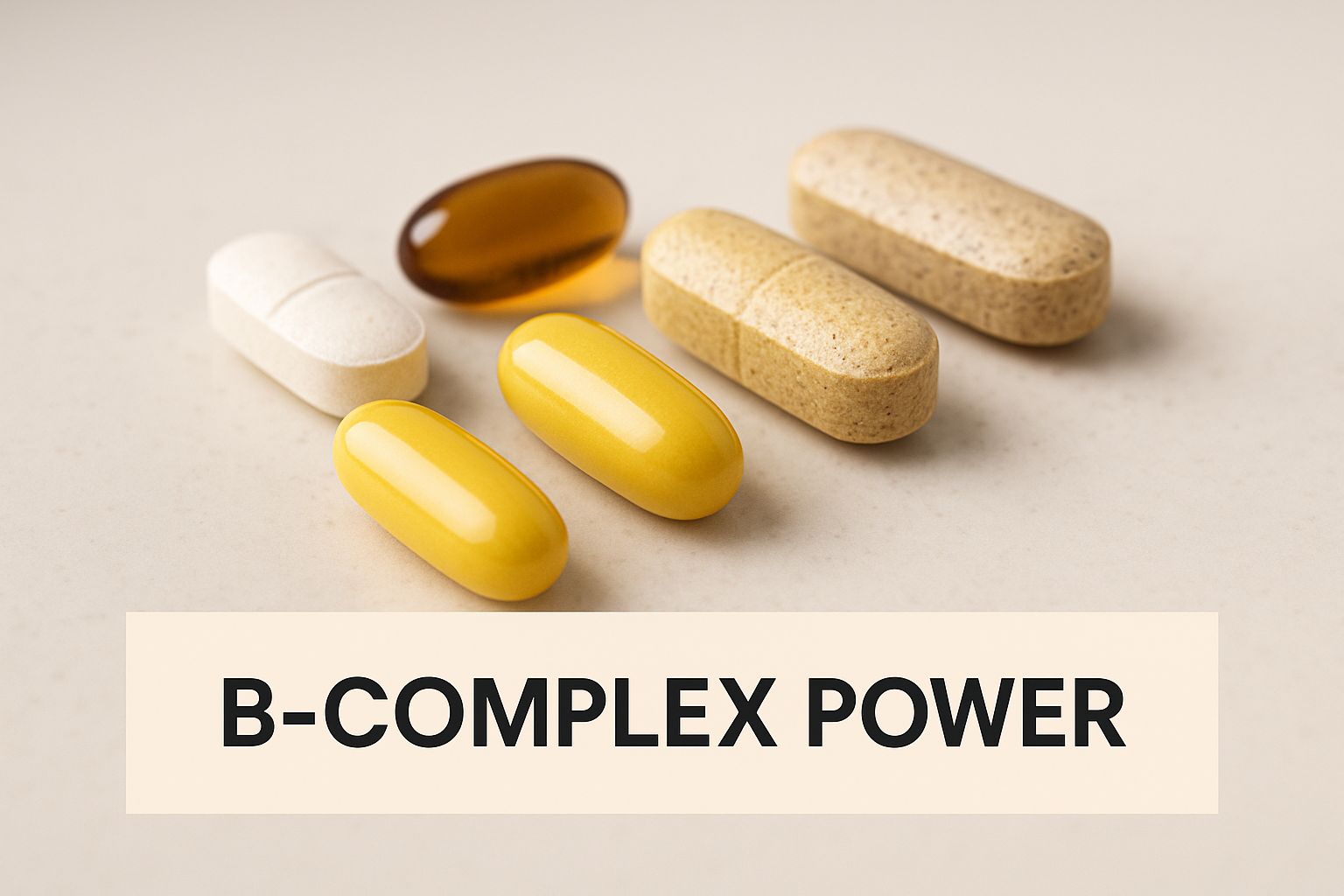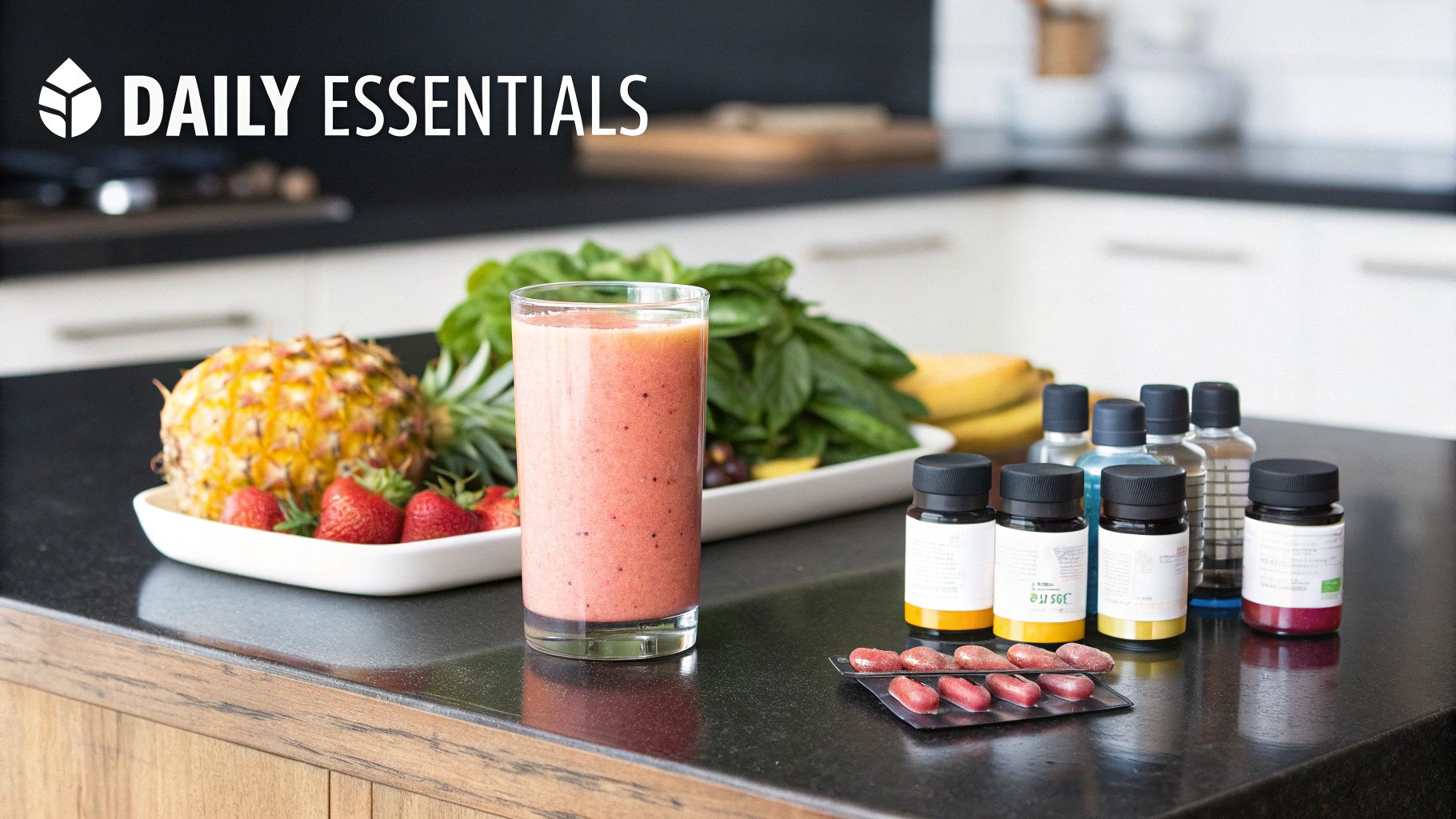Feeling tired is a drag, but you have the power to change it. The key is giving your body the right fuel. Think of B-complex vitamins, iron, magnesium, vitamin C, and vitamin D as your core energy toolkit. These powerhouse nutrients help your body convert food into usable energy, acting as your first line of defense against fatigue. Ready to take action? Let's dive in.
Take Control of Your Energy at a Cellular Level
That drained, sluggish feeling isn't just about sleep or coffee; it’s a sign that your body's internal power plant is running inefficiently. Your food is the raw fuel, but vitamins and minerals are the essential machinery needed to convert it into energy.
To fix this, you need to supply the right nutrients. By ensuring your body has what it needs, you can get your internal engine firing on all cylinders again. Here’s a quick guide to the essential crew that will help you get there.
Your Action Plan for Natural Energy
Before we get into the details, here's a simple, actionable breakdown of the nutrients you need, what they do, and the best foods to add to your shopping list.
| Nutrient | Your Actionable Step | Top Foods to Eat Now |
|---|---|---|
| B Vitamins | Eat foods that unlock energy from your meals. | Add leafy greens, salmon, eggs, and lean meat to your diet. |
| Iron | Boost your body’s oxygen delivery to every cell. | Choose red meat, spinach, lentils, or fortified cereals. |
| Magnesium | Recharge your cellular batteries for better energy production. | Snack on nuts, seeds, and dark chocolate. Eat more avocados. |
| Vitamin C | Support your adrenal glands and improve iron absorption. | Eat more citrus fruits, bell peppers, strawberries, and broccoli. |
| Vitamin D | Improve muscle function and elevate your mood. | Get more fatty fish, egg yolks, and safe sun exposure. |
Let's break down how you can use these nutrients to actively boost your vitality.
- Action for B Vitamins: Make it a priority to include B-vitamin-rich foods in every meal to ignite your metabolism and release energy from your food.
- Action for Iron: Ensure your diet contains iron to deliver oxygen to your cells. Without enough oxygen, your body simply can't produce energy effectively.
- Action for Magnesium: Incorporate magnesium-rich foods to support the creation of ATP—your body's main energy source. This mineral is involved in over 300 critical bodily reactions.
- Action for Vitamin C: Pair your iron sources with Vitamin C to maximise absorption and support your adrenal glands, which help manage stress.
- Action for Vitamin D: Get regular, safe sun exposure or eat Vitamin D-rich foods to support muscle function and maintain a positive mood, both crucial for feeling energetic.
It's no surprise that more and more people are turning to supplements for support. The UK vitamin supplements market was valued at around USD 1.86 billion and is expected to climb to USD 2.97 billion by 2035. This boom is driven by a growing desire for better health and a proactive approach to wellness. You can explore more data on the UK vitamin supplements market to see the full trend.
Put Your Body's Core Energy Team to Work
To actively boost your energy, you need to support the key players inside your body that create it. Think of these vitamins and minerals as your personal energy production crew. When you provide them with what they need, you feel on top of your game. But if one is missing, the whole system slows down. Let's look at the actionable steps you can take to support each member of this team.
Step 1: Fuel Your Metabolism with B Vitamins
Your first action is to ensure a steady supply of B-complex vitamins. These are the 'metabolic spark plugs' that help convert food into usable energy, known as adenosine triphosphate (ATP). Without them, your body can't unlock the fuel from your diet.
For example, a lack of Vitamin B12 leads to the creation of large, ineffective red blood cells that can't carry oxygen properly. This condition, called megaloblastic anaemia, directly causes fatigue. To prevent this, actively include foods rich in B vitamins or consider a B-complex supplement.
By taking this step, you ensure this coordinated team can work efficiently to maintain a healthy metabolism.
Step 2: Optimise Oxygen Delivery with Iron
Your next move is to focus on iron. This mineral is the backbone of your body’s 'oxygen delivery service'. It's a key part of haemoglobin, the protein that carries oxygen from your lungs to every cell, including your muscles and brain.
When you're low on iron, your body can't make enough healthy oxygen-carrying cells, leading to iron-deficiency anaemia—a primary cause of constant tiredness and weakness.
Actionable Tip: Think of your muscles and brain as furnaces needing oxygen to burn fuel. Your job is to ensure the iron delivery trucks are always running. To do this, eat iron-rich foods daily.
Watch for these red flags and consult your GP if you experience them:
- Unexplained tiredness and a serious lack of energy
- Pale skin
- Feeling out of breath during simple activities
- Noticeable heartbeats (heart palpitations)
Step 3: Recharge Your Cells with Magnesium
Your third step is to get enough magnesium, the 'cellular battery charger'. This mineral is involved in over 300 biochemical reactions, with a primary role in creating and stabilising ATP, your body's energy currency.
Without enough magnesium, your cellular batteries can't hold a proper charge. In the UK, this is a widespread issue, with trends mirroring the US where approximately 48% of the population doesn't get the recommended amount. Your action is to consciously add magnesium-rich foods like nuts, seeds, and whole grains to your daily diet.
Step 4: Regulate Mood and Muscles with Vitamin D
Finally, take action to maintain your Vitamin D levels. Think of it as your 'mood and muscle regulator'. A deficiency is directly linked to muscle weakness and fatigue because it affects how your mitochondria—the powerhouses inside your cells—function.
Low Vitamin D can also tank your mood, contributing to lethargy. Since mood and energy are tightly linked, getting enough of this 'sunshine vitamin' is a must. Especially in the UK, where sunlight is limited, this may mean supplementing during autumn and winter.
How to Choose an Effective Energy Supplement

Walking down the supplement aisle can be confusing. To choose the right boost energy vitamins, you need an action plan. Your goal is simple: find a product your body can absorb and use effectively.
First, consider the form. Supplements come as capsules, tablets, powders, and liquids. The form impacts how well your body absorbs the nutrients, a concept known as bioavailability. Liquids and easily dissolvable forms often absorb faster. The UK’s liquid dietary supplement market, valued at USD 237.6 million, is growing because people want formats that act more efficiently.
Action Point: Prioritise Bioavailability and Active Forms
When selecting a supplement, your most important action is to check for bioavailability. This is the percentage of a nutrient that actually enters your bloodstream. A highly bioavailable supplement gives you the best results.
For example, when choosing a Vitamin B12 supplement, look for methylcobalamin instead of cyanocobalamin. Methylcobalamin is the ‘active’ form, meaning your body can use it immediately without extra conversion steps. This makes it far more efficient.
Actionable Tip: Choose supplements with active, bioavailable ingredients. It's like using a key that’s already cut to fit the lock, saving your body from doing extra work.
Action Point: Learn to Read a Supplement Label
Become a savvy shopper by learning how to decode the label. This simple skill empowers you to make confident choices and stop wasting money.
Here’s your checklist for choosing a high-quality supplement:
- Check the Active Ingredients: Look for the specific forms of vitamins. For B12, choose methylcobalamin. For magnesium, select magnesium glycinate over magnesium oxide for better absorption.
- Look for Third-Party Testing: Seals from organisations like NSF International or Informed-Sport indicate independent testing for purity and potency.
- Scan for Fillers and Additives: Avoid long lists of artificial colours, flavours, and unnecessary fillers like magnesium stearate. A simpler formula is usually a better choice.
Use these points to confidently pick high-quality natural energy supplements formulated for real results.
Your Action Plan for Supplement Timing and Dosage
Choosing the right boost energy vitamins is the first step. The next action is to decide when and how to take them for maximum effect. A smart supplement schedule works with your body's natural rhythm to ensure it can absorb and use nutrients precisely when needed. This isn't about a rigid routine, but about making small, clever tweaks to get the best results.
Action: Take Energising Vitamins in the Morning
Schedule certain vitamins for the morning to set yourself up for a productive day. Taking them with your first meal helps your body turn breakfast into sustained fuel.
- B-Complex Vitamins: Take these with breakfast. B vitamins are key to your metabolism, helping convert food into energy. A morning dose kick-starts this process for a steady energy release all day.
- Iron: The morning is the best time for iron supplements. To maximise absorption, always take it with a source of Vitamin C.
Actionable Tip: The teamwork between nutrients is powerful. Taking Vitamin C with your iron supplement can boost iron absorption by as much as 67%. This simple trick helps fight fatigue more effectively.
Action: Use Evening Supplements for Recovery
Just as some vitamins are for the morning, others work best at night. These support recovery and muscle repair, which are essential for feeling energetic the next day.
Take magnesium an hour or two before bed. This mineral is a natural muscle relaxant that helps calm the nervous system, leading to better quality sleep. Good sleep is fundamental for restoring your energy levels so you wake up refreshed.
Action: Stick to Safe Dosages and Smart Pairings
Your most important action is to stick to the recommended dosages for safety and effectiveness. Going over the UK's recommended daily allowance (RDA) can do more harm than good.
UK Recommended Daily Allowances for Key Energy Nutrients:
| Nutrient | Recommended Daily Allowance (Adults) | Notes on Safe Upper Limits |
|---|---|---|
| Iron | 8.7mg (men), 14.8mg (women 19-50) | High doses can be toxic; always consult a GP. |
| Magnesium | 300mg (men), 270mg (women) | Supplement intake shouldn't go above 400mg. |
| Vitamin C | 40mg | Up to 1,000mg is generally considered safe. |
| Vitamin D | 10 micrograms (400 IU) | Do not take more than 100 micrograms (4,000 IU). |
Always start with the dose recommended on the product label unless your doctor has advised otherwise. For powerful compounds like shilajit, timing is also critical. To learn more, read our guide on the best time to take shilajit for maximum benefits.
Fuelling Up with Energy-Boosting Foods and Habits

Supplements are great, but they work best when combined with an energy-focused lifestyle. Think of energy-boosting vitamins as the turbo-charge for your engine; your food and habits are the high-quality fuel that keeps it running smoothly. The best action you can take is to create a synergy between your diet, habits, and supplements for a constant, reliable supply of energy.
Action Plan: Supercharge Your Diet Today
You don't need a complete dietary overhaul. Start by making small, consistent changes. Swapping a sugary snack for a handful of nuts or adding spinach to a smoothie can make a huge difference.
- For B Vitamins: Actively add leafy greens like spinach and kale to your meals. Make lean meats, salmon, eggs, and legumes your go-to protein sources.
- For Iron and Vitamin C: Combine plant-based iron from lentils or fortified cereals with vitamin C-rich foods like bell peppers or a squeeze of lemon juice to maximise absorption.
- For Magnesium: Make it a habit to snack on nuts and seeds (especially pumpkin seeds). Add avocados to your salads and enjoy a small square of dark chocolate.
It's clear that people are catching on to the powerful link between nutrition and well-being. Here in the UK, the vitamin supplements market was valued at a huge USD 5.81 billion and is expected to rocket to USD 12.0 billion by 2035. It's all driven by a greater focus on health and finding ways to combat the fatigue of modern life.
The Three Pillars of Action for Natural Energy
Beyond your diet, three core habits are non-negotiable for sustained energy. Master these to support your supplement and diet efforts.
- Prioritise Sleep: Your goal is 7-9 hours of quality, uninterrupted sleep per night. This is when your body repairs cells and recharges for the day ahead. Make it a priority.
- Stay Hydrated: Mild dehydration quickly drains energy. Your action is to drink plenty of water throughout the day, even before you feel thirsty.
- Incorporate Movement: You don't need to run a marathon. A brisk daily walk improves circulation, delivering oxygen and nutrients to your cells more efficiently. Schedule it into your day.
By weaving these simple habits into your life, you create a holistic system for vitality. For more tips, check out our guide on other natural ways to boost energy.
Common Questions About Vitamins for Energy
Diving into supplements can bring up questions. Getting clear, actionable answers will help you build a routine that works. Let's tackle the most common queries about vitamins to boost energy.
Can I Get All My Energy Vitamins from Diet Alone?
While a healthy diet is your foundation, it can be tough to get everything from food alone. Modern farming practices can reduce nutrient density, and lifestyles like veganism can create gaps.
For example, Vitamin B12 is found almost exclusively in animal products, making a supplement a necessary action for vegans. Similarly, getting enough Vitamin D from the UK sun is a challenge, especially in winter. Supplements are a practical way to fill these gaps and ensure your body has what it needs.
How Long Until I Feel a Difference?
The timeline depends on the nutrient and how deficient you were. The key action is to be consistent.
Many people feel a lift from B-complex vitamins within a few days to a week. Minerals like iron or magnesium take longer; you may need several weeks of consistent use to replenish your body's stores. Be patient and stick with it.
The Bottom Line: Consistency is everything. Stick with your routine and give your body the time it needs to rebuild. Lasting energy is built over weeks, not overnight.
Are There Any Side Effects to Consider?
When you stick to recommended dosages, energy vitamins are generally safe. However, taking excessive amounts of certain nutrients can cause problems.
For example, very high doses of iron can cause digestive issues. Your most important action is to always follow the dosage on the label or consult your GP, especially if you have existing health conditions or take other medications.
Should I Take a Multivitamin or Individual Supplements?
The right choice depends on your goal. A good multivitamin is a great "insurance policy" to cover your general nutritional bases.
However, if your specific goal is to boost energy, a targeted, individual supplement (or a specialised energy-focused blend) will often provide a more effective dose. A hybrid approach can work well: a daily multivitamin for overall support, plus specific nutrients like iron or magnesium to address your unique needs.
Ready to feel the difference that a targeted, high-quality supplement can make? The Oji Shilajit gummies are formulated with over 85 trace minerals and potent fulvic acid to naturally support your energy, focus, and vitality. Click here to reclaim your energy with Oji Shilajit.








